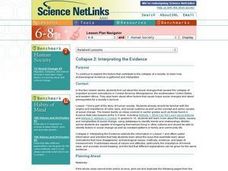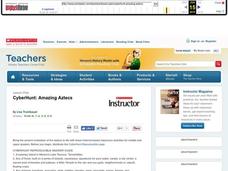Dick Blick Art Materials
Stitch It Up!
Ever think about combining the art forms of painting and embroidery? Then this art lesson plan is right up your alley! Given a piece of white cloth, young artists first create a grayscale painting and then highlight...
Curated OER
Saris, Kimonos, Tagas and Smocks: Exploring Clothing Across Cultures
Students explore via the internet all types of clothing around the world. Students discuss that the way people dress is an important means of expressing identity. Students collaborate via Internet research the social purposes of clothing.
Curated OER
Be That As It Maya
Creative projects are a great way to engage your class and can be a fun way to assess mastery! Learners create brochures and postcards that might have been created by and for travelers to ancient Mayan cities. They read and discuss the...
Curated OER
Mummy Madness
Middle schoolers create a mummy using the mummification process. In this mummy activity, students peel an apple and place the peeling in a baby food jar. They carve a face into their apple, dry it in salt and wrap it in toilet paper to...
Curated OER
Human Abstraction
Students explore and compare abstraction of human forms in various ancient cultures and by creating self-portraits using geometric shapes. They identify which geometric shapes form the following features: face, nose, arms, torso, legs,...
Curated OER
Hunters and Gatherers
Sixth graders participate in mapping and other activities to understand why ancient civilizations developed as they did. In this ancient civilization lesson, 6th graders recognize that there were three important climate zones and...
Curated OER
Microbes & History: Microbial influence on the spread of Civilization
Students explore how to extract plant fibers from the flax plant Linum usitatissimum in the process of making linen fibers. Doing so spark interest in the importance of microbial action on the spread of human culture and civilization.
Curated OER
Egyptian Society
Students make body cut-outs out of butcher paper dressed to represent seven different economical statuses of Egyptian society. Students then write papers about their assigned socioeconomic status.
Curated OER
What is Opera?
In this opera worksheet, 8th graders read about the history and evolution of opera as a type of theatre. They answer 4 questions based on the reading using complete sentences.
Curated OER
Science NetLinks: Collapse 2: Interpreting the Evidence
Students continue to explore the factors that contribute to the collapse of a society; they also explore how archaeological evidence is gathered and interpreted. Students explore about the social changes that caused the collapse of...
Curated OER
Using the Patterns and Symbols of Mali Mud Cloth to Convey Identity
Learners participate in relating the role of the arts in defining identity. They examine the community in West African society and how members of that community define their role. They view how artifacts, music and performance can...
Curated OER
Clothesline Sleuth
Sixth graders investigate the origins of clothing production. In this Social Studies lesson, 6th graders examine the components of agriculture involved in making clothes. Students research cotton.
Curated OER
Weather Reporting
Students locate a weather map on the internet and explain or predict the weather for the following day. Students interpret the information on the weather map and pick the correct clothing to wear for that day. Students chart and graph...
Curated OER
World History Worksheet #8
What customs did the Ancient Aztecs practice? In this world history worksheet, students utilize a word bank of 10 terms or phrases to answer 10 fill in the blank questions pertaining to the Aztec culture. A short answer question at the...
Curated OER
Plant Dye Paints
Learners create original paintings using natural dye techniques used in the past in this Art lesson plan about paint colors. The lesson plan may be supplemented with information about pioneers, or ancient civilizations, and how paints...
Curated OER
When in Greece, Do as the Greeks Do
Students examine the contributions of ancient Greeks in this five lesson unit. The explorations reveal how Greece shaped our stories, our modern language, and our society. The study of the Greek myth forms the basis of this unit.
Curated OER
Amazing Aztecs
Young scholars research information about the ancient Aztec culture. In this Aztec lesson, students conduct Internet research about Aztecs to find the answers to questions about their language, jewelry and tools, and the Aztec calendar. ...
Curated OER
Making Inferences
In this literature worksheet, 5th graders focus on making inferences. Students study 5 quotations from the story and respond to 2 short answer questions, drawing inferences from the information that is stated.
American Museum of Natural History
Making a Field Journal
Trowels and brushes are certainly important tools for an archaeologist working on a dig. Perhaps more important, however, is the archaeologist's field journal. Christina Elson, an archaeologist working with the American Museum of Natural...
Dick Blick Art Materials
Painted Lockets
Painted, portable, pocket lockets encourage kids to display personal treasures and items they value. The activity, combining art with social and character studies, is perfect for any classroom.
Curated OER
Look At Those Leaves!
Students collect, observe, sort, and measure leaves. For this leaf lesson, students take a walk to collect leaves. They bring the leaves back into the classroom to observe, sort, and measure them. They visit a website to learn more about...
Curated OER
Early Humans
Sixth graders read about the different types of Humanoid. They examine the different cultural beliefs and their own personal beliefs about evolution. They research the species using the scientific theory about evolution.
Curated OER
Beadwork: Creativity Booster and Stress Reliever
Invite students to experience the benefits of making and working with beads.
Curated OER
Me Oh Maya
Students compare basketball to Mayan ring-ball. They write a newspaper article that may have been published during Mayan times.

























